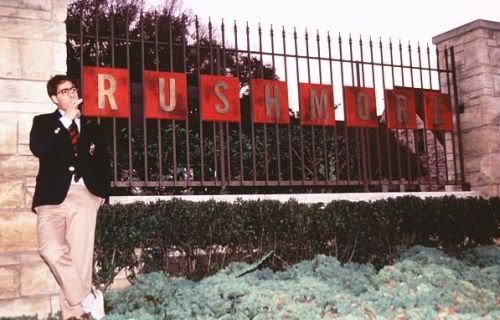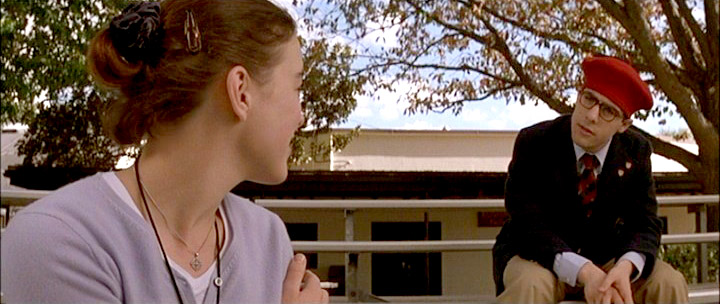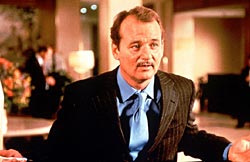Old Stuff
Rushmore (1998)
Directed by Wes Anderson

We all know by now that the original "Star Wars" is not really the first in the series of nine (count 'em!) films that will make up the trilogy of trilogies about the evil Empire that George Lucas cooked up in his brain. We've just seen the beginning of the mega-hype that is going to wash over us with the impending release of the "Star Wars" prequel. I fear with extreme dread that this will start an epidemic of prequels that will breathe new life into (i.e. allow studios to continue the exploitation of) film series' that may never go away. This, of course, will create some problems. For instance, how do you number a prequel? "Friday the 13th: Part -9"? How about "Embryo of Chucky"?

Written by college chums Wes Anderson and Owen Wilson, "Rushmore" can be described as what a 90's prequel to "The Graduate" might be. Jason Schwartzman stars as Max Fischer, who attends the uppity Rushmore prep school with the children of wealthy elitists who pay many top dollars to have their progeny get a premium education. Max doesn't have the same creamy-rich background of the other kids, though. He says that his father is a brain surgeon so he can fit in with the others. The truth is that the closest his barber father ever came to his customer's brains was maybe exposing a little too much scalp. Originally accepted to the school on a scholarship in second grade, fifteen year-old Max is near the end of his Rushmore career. He has no patience for the standards and boundaries of private academy life. If he could major in extracurricular activities, he would be an A student. Unfortunately, Max has no passion for academics. His strength is as a visionary, organizing others into groups such as the Max Fischer Players (he uses them in his stage production of "Serpico") and championing causes like fighting to keep Latin from being cut from the academic program. During his time at Rushmore, he has become quite a people-manipulator.

The father of two of the brattiest boys at the school, Mr. Blume (Bill Murray), impresses Max with a "screw the rich" speech to the students, even though he himself has become a steel magnate. The two become friends and Max makes the mistake of trying to use Blume, himself an older, wiser people-user, to win the heart of a first-grade teacher at the school (Olivia Williams). Predictably, Blume falls in love with her too, and the problems begin. Max is in way over his head; he's too young for the woman of his dreams and there's no way he can outdo Blume. Max and Blume are like younger and older versions of Benjamin Braddock from "The Graduate": Max, the younger, more idealistic student and Blume, the older result of having a few jaded decades under his belt.

"Rushmore" has the same dark, critical attitude towards society as "The Graduate," but it takes a more comedic approach than its spiritual sequel. There's also a similarity in the use of the soundtrack as well, with the music punctuating the scenes and adding attitude rather than falling into the background as mood filler or becoming shameless baby-boomer nostalgia. Wes Anderson, who also directed, gets a kind of sad, understated performance from Bill Murray, but with well-placed trademark Murray moments. Jason Schwartzman has to go back and forth between being the ultimate after-school club geek and the smirking, sarcastic wise-ass, but somehow makes it believable. We get to see how Max handles his relationships with all those around him: classmates, teachers, friends, his father. With some, he is the commander-in-chief. With others, he's out of his league. The variety of situations, the balance between the absurd and the bittersweet, and its offbeat charm keep the movie fresh and make it well worth seeing. I'm sure that some studio puppet critic somewhere has already said something corny like "Rush out to see Rushmore!" -- Rating: $7.50
Mike Santoro -- copyright 1998